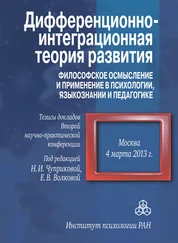Роберт Тайсон - ПСИХОАНАЛИТИЧЕСКИЕ ТЕОРИИ РАЗВИТИЯ
Здесь есть возможность читать онлайн «Роберт Тайсон - ПСИХОАНАЛИТИЧЕСКИЕ ТЕОРИИ РАЗВИТИЯ» — ознакомительный отрывок электронной книги совершенно бесплатно, а после прочтения отрывка купить полную версию. В некоторых случаях можно слушать аудио, скачать через торрент в формате fb2 и присутствует краткое содержание. Город: М., Год выпуска: 1998, ISBN: 1998, Издательство: Деловая книга, Жанр: Психология, на русском языке. Описание произведения, (предисловие) а так же отзывы посетителей доступны на портале библиотеки ЛибКат.
- Название:ПСИХОАНАЛИТИЧЕСКИЕ ТЕОРИИ РАЗВИТИЯ
- Автор:
- Издательство:Деловая книга
- Жанр:
- Год:1998
- Город:М.
- ISBN:5-88687-019-9
- Рейтинг книги:5 / 5. Голосов: 1
-
Избранное:Добавить в избранное
- Отзывы:
-
Ваша оценка:
- 100
- 1
- 2
- 3
- 4
- 5
ПСИХОАНАЛИТИЧЕСКИЕ ТЕОРИИ РАЗВИТИЯ: краткое содержание, описание и аннотация
Предлагаем к чтению аннотацию, описание, краткое содержание или предисловие (зависит от того, что написал сам автор книги «ПСИХОАНАЛИТИЧЕСКИЕ ТЕОРИИ РАЗВИТИЯ»). Если вы не нашли необходимую информацию о книге — напишите в комментариях, мы постараемся отыскать её.
ПСИХОАНАЛИТИЧЕСКИЕ ТЕОРИИ РАЗВИТИЯ — читать онлайн ознакомительный отрывок
Ниже представлен текст книги, разбитый по страницам. Система сохранения места последней прочитанной страницы, позволяет с удобством читать онлайн бесплатно книгу «ПСИХОАНАЛИТИЧЕСКИЕ ТЕОРИИ РАЗВИТИЯ», без необходимости каждый раз заново искать на чём Вы остановились. Поставьте закладку, и сможете в любой момент перейти на страницу, на которой закончили чтение.
Интервал:
Закладка:
Rapaport, D. (1953). On the psycho-analytic theory of affects. In The collected papers of David Rapaport, ed. M. M. Gill. New York: Basic Books, 1967, pp. 476-512.
Rapaport, D. (1960). Psychoanalysis as a developmental psychology. In The collected papers of David Rapaport, ed. M. M. Gill. New York: Basic Books, 1967, pp. 820-852.
Rapaport, D., and Gill, M. M. (1959). The points of view and assumptions of metapsychology. In The collected papers of David Rapaport, ed. M. M. Gill. New York: Basic Books, 1967, pp. 795-811.
Reeves, J. W. (1965). Thinking about thinking. New York: George Braziller. Reich, A. (1953). Narcissistic object choice in women. I. Amer. Psychoanal. Assn., 1:22-44.
Reich, A. (1954). Early identifications as archaic elements in the superego. Amer. Psychoanal. Assn., 2:218-238.
Reich, A. (1958). A character formation representing the integration of unusual conflict solutions into the ego structure. Psychoanal. Study Child, 13:309-323.
Reich, A. (1960), Pathologic forms of self — esteem regulation. Psychoanal. Stud. Child, 15:215-232.
Renik, O. (1972). Cognitive ego function in the phobic symptom. Psychoanal. Q., 41:537-555.
Rheingold, H. L. (1969). The social and socializing infant. In Handbook of socialization theory and research, ed. D. Goslin. Chicago: Rand McNally, pp. 779-790.
Riess, A. (1978). The mother's eye: For better and for worse. Psychoanal. Study. Child, 33:381-409.
Ritvo, S. (1974). Current status of the concept of infantile neurosis. Psychoanal. Study Child, 29:159-188.
Ritvo, S. (1976). Adolescent to woman. Amer. Psychoanal. Assn., 24: 127-138.
Ritvo, S. (1981). Anxiety, symptom formation and ego autonomy. Psychoanal. Study Child, 36:339-364.
Ritvo, S., and Solnit, A.J. (1960). The relationship of early ego identification to superego formation. Int. J. Psychoanal., 41:295-300.
Roiphe, H., and Galenson, E. (1981). Infantile origins of sexual identity. New York: Int. Univ. Press.
Rosenblatt, A. D. ( 1985). The role of affect in cognitive psychology and psychoanalysis. Psychoanal. Psychot., 2:85-97.
Rosenblatt, A. D., and Thickstun.J. T. (1977). Modern psychoanalytic concepts ofgeneral psychology; Part 2: Motivation. Psychological Issues, Monograph 42/43. New York: Int. Univ. Press.
Rosner, H. (1972). «Of music, magic, and mystery»: Studies in adolescentsynthesis. Amer. Psychoanal. Assn., 20:395-416.
Ross, J. M. (1975). The development of paternal identity: A critical review of the literature on nurturance and generativity in boys and men. Amer. Psychoanal. Assn., 23:783-818.
Ross, J. M. (1982a). From other to father: The boy's search for a generative identity and the oedipal era. In Father and child: Developmental and clinical perspectives, ed. S. H. Cath, A. R. Gurwitt, andJ. M. Ross. Boston: Little, Brown, pp. 198-203.
Ross, J. M. (1982b). Oedipus revisited: Laius and the «Laius Complex.» Psychoanal. Study Child, 37:169-200.
Rothstein, A. (1980). The narcissistic pursuit of perfection. New York: Int. Univ. Press.
Rothstein, A. (1983). The structural hypothesis: An evolutionary perspective. New York: Int. Univ. Press.
Rothstein, A. (1988). The representational world as a substructure of the ego. J. Amcr. Psychoanal. Assn., 36:191-208.
Ryeroft, C. (1956). Symbolism and its relationship to the primary and secondary process. Int. J. Psychoanal., 37:137-146.
Ryeroft, C. (1968). Imagination and reality: Psycho-analytical essays, 1951 — 1961. London: Hogarth.
Sachs, H. (1929). One motive factor in formation of super-ego in women. Int. J. Psychoanal., 10:39-50.
Sander, L. W. (1962). Issues in early mother-child interaction. J. Amer. Acad. Child Psychiat., 1:141-166.
Sander, L. W. (1964). Adaptive relationships in early mother-child interaction. J. Amer. Acad. Child Psychiat., 3:231-164.
Sander, L. W. (1969). Regulation and organization in the early infant-caretaker system. In Brain and early behavior, ed. R. Robinson. London: Academic Press, pp. 311-332.
Sander, L. W. (1975). Infant and carctaking environment: Investigation and conceptualization of adaptive behavior in a system of increasing complexity. In Explorations in child psychiatry, ed. E. J. Anthony. New York: Plenum, pp. 129-166.
Sander, L. W. (1980). Investigation of the infant and its caretaking environment as a biological system. In The course of life. Vol. I, ed. S. 1. Greenspan and G. H. Pollock. Publication No. (ADM) 80-786. Washington, D.C.: DHHS.pp. 177-201.
Sander, L. W. (1983). Polarity, paradox, and the organizing process in development. In Frontiers of infant psychiatry, ed. J. D. Call, E. Galenson, and R. L. Tyson. New York: Basic Books, pp. 333-346.
Sander, L. W.; Stechler, G.; Burns, P.; andJulia, H. (1970). Early mother-infantinteraction and 24-hour patterns of activity and sleep. Amcr. Acad. Child Psychiat., 9:103-123.
Sander, L. W.; Stechler, G.; Burns, Р.; and Lee, A. (1979). Change in infant and caregiver variables over the first two months of life: Integration of action in early development. In Origins of the infant's social responsiveness, ed. E. Thoman. Hilisdale, N. J.: Eribaum, pp. 21-28.
Sandier, A.-M. (1975). Comments on the significance of Piaget's work for psychoanalysis. Int. Rev. Psychoanal., 2:365-378.
Sandier, A.-M. (1977). Beyond eight — month anxiety, Int.]. Psychoanal., 58:195-208.
Sandier, J. (196Qa). On the concept of the superego. Psychoanal. Study Child, 15:128-162.
Sandier, J. (1960b). The background of safety. Int.]. Psychoanal., 41:352-356.
Sandier, J. (1974). Psychological conflict and the structural model: Some clinical and theoretical implications. Int.]. Psychoanal., 55:53-72.
Sandier, J. (1981). Character traits and object relationships. Psychoanal. Q., 50:694-708.
Sandier, J. (1983). Reflections on some relations between psychoanalytic concepts and psychoanalytic practice, Int. J. Psychoanal., 64:35-45.
Sandier, J. (1985). Towards a reconsideration of the psychoanalytic theory ofmotivation. Bull. Anna Freud Centre, 8:223-244.
Sandier, J. ( 1987). The concept of projective identification. In Projection, identification, projection identification, ed. J. Sandier. Madison, Conn.: Int. Univ. Press, pp. 13-26.
Sandier, J., and Dare, C. (1970). The psychoanalytic concept of oralityty. Psychosom. Res., 14:211-222.
Sandier, J.; Dare, C.; and Holder, A. (1972). Frames of reference: The historical context and phases in the development of psychoanalysis. Brit. j. Med. Psychol., 45:133-142.
Sandier, J., and Freud, A. (1985). The analysis of defense: The ego and the mechanisms of defense revisited. New York: Int. Univ. Press.
Sandier, J.; Holder, A.; and Meers, D. (1963). The ego ideal and the ideal self. Psychoanal. Study Child, 18:139-158.
Sandier, J., and Joffe, W. G. (1969). Towards a basic psycho-analytic model. Int. J. Psychoanal., 50:79-90.
Sandier, J., and Rosenblatt, B. (1962). The concept of the representational world. Psychoanal. Study Child, 17:128-145.
Sandier, J., and Sandier, A.-M. (1978). On the development of object relationships and affects, Int. J. Psychoanal., 59:285-296.
Sarnoff, C. (1976). Latency. New York: Aronson.
Schafer, R. (1960). The loving and beloved superego in Freud's structural theory. Psychoanal. Study Child, 15:163-190.
Schafer, R. (1974). Problems in Freud's psychology of women. J. Amer. Psychoanal. Assn., 22:459-485.
Schafer, R. (1976). A new language for psychoanalysis. New Haven: Yale Univ. Press.
Scharfman, M. (1988). History of child analysis. Paper presented to workshop on the Significance of Child and Adolescent Analysis for Clinical Work with Adults. American Psychoanalytic Association, New York City, November.
Schulman, A. H., and Kaplowitz, C. (1977). Mirror — image response during the first two years of life. Developmental Psychology, 10:133-142.
Читать дальшеИнтервал:
Закладка:
Похожие книги на «ПСИХОАНАЛИТИЧЕСКИЕ ТЕОРИИ РАЗВИТИЯ»
Представляем Вашему вниманию похожие книги на «ПСИХОАНАЛИТИЧЕСКИЕ ТЕОРИИ РАЗВИТИЯ» списком для выбора. Мы отобрали схожую по названию и смыслу литературу в надежде предоставить читателям больше вариантов отыскать новые, интересные, ещё непрочитанные произведения.
Обсуждение, отзывы о книге «ПСИХОАНАЛИТИЧЕСКИЕ ТЕОРИИ РАЗВИТИЯ» и просто собственные мнения читателей. Оставьте ваши комментарии, напишите, что Вы думаете о произведении, его смысле или главных героях. Укажите что конкретно понравилось, а что нет, и почему Вы так считаете.












